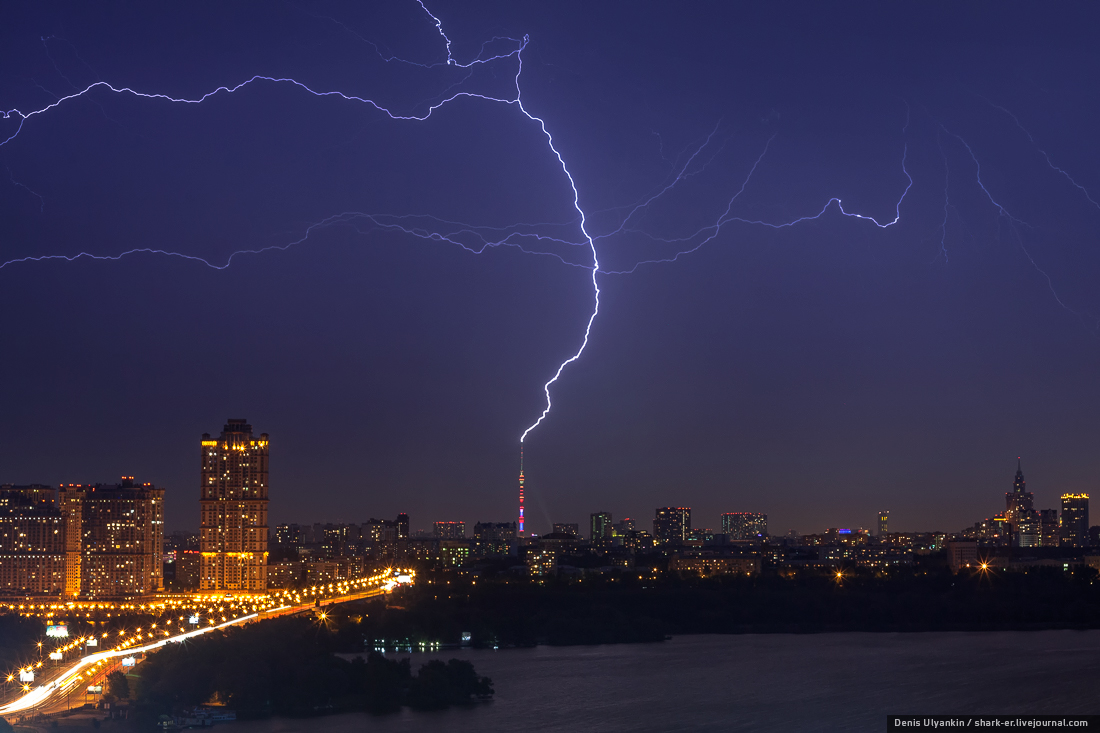
Moscow experienced a severe thunderstorm and hail, bringing an end to an extreme heatwave. The storm caused significant disruption across the city: streets were flooded, bridges were closed, and taxi prices soared dramatically. Forecasters confirmed that the period of extreme heat has ended. Saturday, July 12th, had been recorded as the hottest day in Moscow in 122 years, with temperatures peaking at +36°C.

The thunderstorm, accompanied by hail and heavy downpour, struck the Moscow region after an extended period of abnormal heat. City streets were inundated, resembling rivers, as the drainage systems were overwhelmed by the sheer volume of rainfall. Residents caught outdoors sought refuge wherever possible, including pedestrian underpasses and metro entrances.
Residents across the Moscow region shared striking visuals of the intense downpour and lightning on social media. Powerful, squall-like winds reportedly almost detached the roof of the «Moscow» medical complex. In a scene described humorously by some, the area around Patriarch Ponds became so flooded that taxi drivers were likened to Venetian gondoliers.
Sections of the Moscow Ring Road (MKAD) were also submerged. Drivers reported that water levels on the highway near the 16th kilometer reached the height of the roadside barriers. According to the Department of Transport, traffic on the outer ring in the Kapotnya area was blocked due to the flooding.
Amidst the chaos, taxi fares surged dramatically, as recounted by Ilya Balakin, an employee of Business FM:
I was returning from the polyclinic with my child. The traffic situation on the roads was normal, not particularly congested. But I needed to send relatives home, to a neighboring town, and while the usual trip cost was 1500-1700 rubles, the economy fare started at 6000 rubles. `Comfort`, `Comfort Plus` were already 8000, and even cheaper than business class, which was asking around 8500. I even have screenshots. This is somewhat outrageous because when you book a doctor`s appointment, and there`s a queue, and you wait a week or two, the prices don`t increase. The polyclinic, even a commercial one, has a fixed rate. Why Yandex has such pricing is phenomenal. I also noticed many people leaving the beaches. There are many holidaymakers near reservoirs now, and it seems the high demand is precisely related to these people needing to escape the storm.
While some residents were merely soaked by the rain, others had to actively protect themselves and their cars from the hailstones. On Telegram channels, people across the affected areas shared footage of the icy precipitation, reporting sizes ranging from small pellets to hail as large as quail eggs in some locations.
Brief, small-sized hail was also reported in Podolsk, according to Dinar, a resident of the MIS settlement in the Podolsk district of the Moscow region:
At first it was so clear, so hot – very hot. And within 15 minutes, the weather changed drastically, and hail began, lasting for about 10 minutes. This was not far from Podolsk, about three kilometers away.
When asked about car damage, he added: «We managed to get ours under a canopy, everything`s fine in that regard. We`re in a village, there weren`t many cars around. No trees were felled, just small branches on the road. Everything`s okay.»
This type of precipitation contributes to a gradual temperature decrease and a change in air masses. The abnormal heatwave is not expected to return to the Moscow region. Alexander Shuvalov, head of the Meteo forecast center, commented on the weather forecast for Sunday:
Today, the rains drastically changed the situation – temperatures dropped literally in minutes from +32°C to +18…+20°C. But this is a very short-lived temperature drop, occurring right behind the cumulonimbus clouds. As for what`s next – this is the first sign of a weather change, a transition from the anomalous extreme heat to moderately warm weather with temperatures around +25…+26°C and daily thunderstorms.
Tomorrow, the rains will continue: they will end this evening, the cumulonimbus cloudiness will dissipate, then take a break, and tomorrow afternoon a new zone of precipitation will approach Moscow and the Moscow region. And this will repeat day after day. Tomorrow, the temperature will already take the first step down and stop around the 30-degree mark, and then drop to a moderate and quite typical July +25…+26°C. But, I repeat, the extreme heat is over – now we await moderately warm weather with thunderstorms.
Saturday in Moscow officially marked the hottest day in 122 years. The capital`s air temperature reached +36°C, setting a new record and breaking the previous one from 1903.











